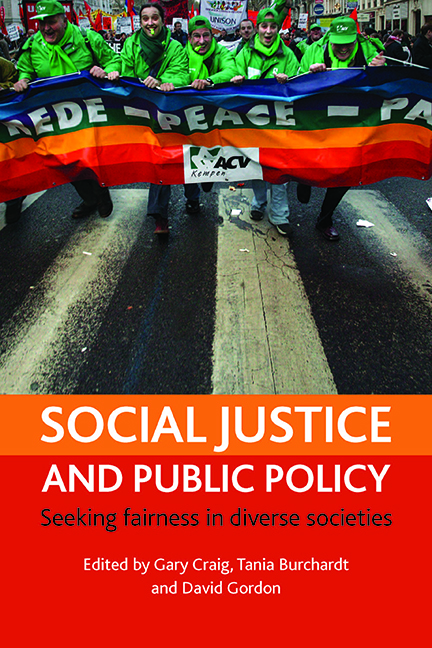Book contents
- Frontmatter
- Dedication
- Contents
- Acknowledgements
- Notes on contributors
- Introduction
- one Social justice and public policy: a view from political philosophy
- two Social justice and public policy: a social policy perspective
- three Multiculturalism, social justice and the welfare state
- four Structural injustice and the politics of difference
- five Recognition and voice: the challenge for social justice
- six Globalisation, social justice and the politics of aid
- seven Social justice and the family
- eight Children, policy and social justice
- nine Social justice in the UK: one route or four?
- ten Monitoring inequality: putting the capability approach to work
- eleven The limits of compromise? Social justice, ‘race’ and multiculturalism
- twelve Understanding environmental justice: making the connection between sustainable development and social justice
one - Social justice and public policy: a view from political philosophy
Published online by Cambridge University Press: 19 January 2022
- Frontmatter
- Dedication
- Contents
- Acknowledgements
- Notes on contributors
- Introduction
- one Social justice and public policy: a view from political philosophy
- two Social justice and public policy: a social policy perspective
- three Multiculturalism, social justice and the welfare state
- four Structural injustice and the politics of difference
- five Recognition and voice: the challenge for social justice
- six Globalisation, social justice and the politics of aid
- seven Social justice and the family
- eight Children, policy and social justice
- nine Social justice in the UK: one route or four?
- ten Monitoring inequality: putting the capability approach to work
- eleven The limits of compromise? Social justice, ‘race’ and multiculturalism
- twelve Understanding environmental justice: making the connection between sustainable development and social justice
Summary
Introduction
Many of those active within social policy, either as theorists or practitioners, became interested in the field in which they work at least in part through their perception of what they believe to be the profound social injustices they see around them. Hence they conceive of their work as part of a movement for social justice. Despite this, the positive requirements of social justice, in detail, are contested. Of course, some gross social injustices are easily recognisable even without an explicit theory of justice. In other cases there can be serious disagreements about what social justice requires. Commonly it is assumed that social justice is in some way connected with ideas of equality, but how an ideal of equality is to be formulated, and the relation between social justice and equality, remain disputed.
The difficulties theorists in social policy have in identifying a clear theory of social justice reflect a series of disagreements within political philosophy. These disagreements arise at more than one level, and this is clearly an impediment for those who wish to take a definitive notion of social justice from political philosophy and use it to assess, or even generate, social policy. Hence, this is an obstacle for those in social policy who wish to see their work informed by greater theoretical engagement. Yet it is also a problem for political philosophers who can find themselves sidelined and ignored when their theories cannot be brought into contact with real-life policy issues.
The remainder of this chapter falls into four sections. The next section surveys the existing state of debate on equality and social justice within political philosophy. The second section explores some topics within social policy, looking particularly at the issue of disability to explore the connections with theoretical approaches to social justice. A way forward is suggested in the third section, by a combination of suspending some philosophical disputes that currently have little practical bearing, and enriching philosophical conceptual vocabulary in the light of social policy. The final section concludes by reviewing the advantages for both political philosophy and social policy of taking such an approach.
- Type
- Chapter
- Information
- Social Justice and Public PolicySeeking Fairness in Diverse Societies, pp. 17 - 32Publisher: Bristol University PressPrint publication year: 2008



